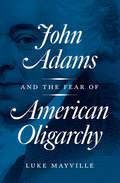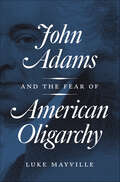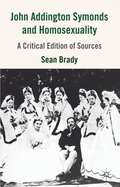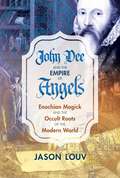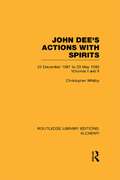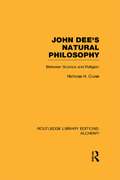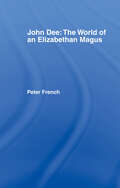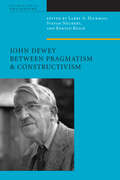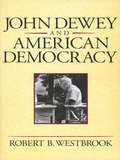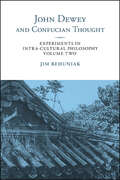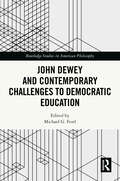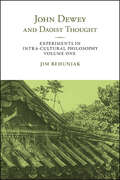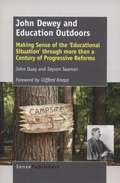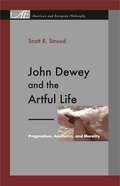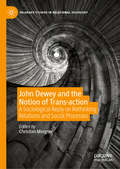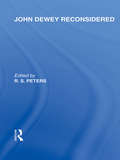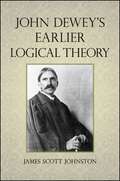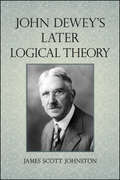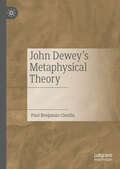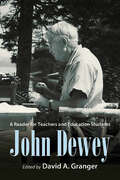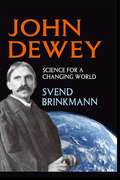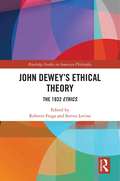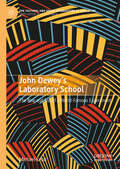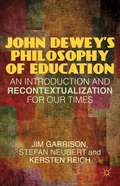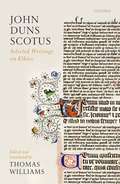- Table View
- List View
John Adams and the Fear of American Oligarchy
by Luke MayvilleLong before "the one percent" became a protest slogan, American founding father John Adams feared the power of a class he called simply "the few"--the wellborn, the beautiful, and especially the rich. In John Adams and the Fear of American Oligarchy, Luke Mayville presents the first extended exploration of Adams's preoccupation with a problem that has a renewed urgency today: the way in which inequality threatens to corrode democracy and empower a small elite. By revisiting Adams's political writings, Mayville draws out the statesman's fears about the danger of oligarchy in America and his unique understanding of the political power of wealth--a surprising and largely forgotten theory that promises to illuminate today's debates about inequality and its political consequences.Adams believed that wealth is politically powerful in modern societies not merely because money buys influence, but also because citizens admire and even sympathize with the rich. He thought wealth is powerful in the same way that beauty is powerful--it distinguishes its possessor and prompts reactions of approval and veneration. Citizens vote for--and with--the rich not because, as is often said, they hope to be rich one day, but because they esteem the rich and submit to their wishes. Mayville explores Adams's theory of wealth and power in the context of his broader concern about social and economic inequality, and also examines his ideas about how oligarchy might be countered.A compelling work of intellectual history, John Adams and the Fear of American Oligarchy also has important lessons for today's world of increasing inequality.
John Adams and the Fear of American Oligarchy
by Luke MayvilleWhy American founding father John Adams feared the political power of the rich—and how his ideas illuminate today's debates about inequality and its consequencesLong before the "one percent" became a protest slogan, American founding father John Adams feared the power of a class he called simply "the few"—the wellborn, the beautiful, and especially the rich. In John Adams and the Fear of American Oligarchy, Luke Mayville explores Adams’s deep concern with the way in which inequality threatens to corrode democracy and empower a small elite. Adams believed that wealth is politically powerful not merely because money buys influence, but also because citizens admire and even identify with the rich. Mayville explores Adams’s theory of wealth and power in the context of his broader concern about social and economic disparities—reflections that promise to illuminate contemporary debates about inequality and its political consequences. He also examines Adams’s ideas about how oligarchy might be countered. A compelling work of intellectual history, John Adams and the Fear of American Oligarchy has important lessons for today’s world.
John Addington Symonds (1840–1893) and Homosexuality
by Sean BradyIn John Addington Symonds (1840 1893) and Homosexuality: A Critical Edition of Sources, Sean Brady brings together for the first time the correspondence between John Addington Symonds and Havelock Ellis on the project of Sexual Inversion. Ellis'Sexual Inversion became eventually his totemic Studies in the Psychology of Sex. But in many respects, the project Sexual Inversion was Symonds' brainchild. Ellis and Symonds never actually met, so the correspondence represents their completecommunication on the subject. Many of the letters in this critical source edition are published here for the first time, and the correspondence in its entirely has never been published together. This critical source edition also publishes Symonds' original privately printed essays, 'A Problem in Greek Ethics', and 'A Problem in Modern Ethics'. Sean Brady's critical introduction provides a new and interdisciplinary analysis of the significance of these texts, the correspondence, and of Symonds' place in the history of ideas and of gender and sexuality. This volume is an indispensable reference for a wide range of scholars working across multidisciplinary fields of inquiry that focus on British and continental histories of medicine and sexuality, gender history and studies of nineteenth-century culture, and introduces the new reader to Symonds' life and ideas on homosexuality. "
John Dee and the Empire of Angels: Enochian Magick and the Occult Roots of the Modern World
by Jason LouvA comprehensive look at the life and continuing influence of 16th-century scientific genius and occultist Dr. John Dee • Presents an overview of Dee’s scientific achievements, intelligence and spy work, imperial strategizing, and his work developing methods to communicate with angels • Pieces together Dee’s fragmentary Spirit Diaries and examines Enochian in precise detail and the angels’ plan to establish a New World Order • Explores Dee’s influence on Sir Francis Bacon, modern science, Rosicrucianism, and 20th-century occultists such as Jack Parsons, Aleister Crowley, and Anton LaVey Dr. John Dee (1527-1608), Queen Elizabeth I’s court advisor and astrologer, was the foremost scientific genius of the 16th century. Laying the foundation for modern science, he actively promoted mathematics and astronomy as well as made advances in navigation and optics that helped elevate England to the foremost imperial power in the world. Centuries ahead of his time, his theoretical work included the concept of light speed and prototypes for telescopes and solar panels. Dee, the original “007” (his crown-given moniker), even invented the idea of a “British Empire,” envisioning fledgling America as the new Atlantis, himself as Merlin, and Elizabeth as Arthur. But, as Jason Louv explains, Dee was suppressed from mainstream history because he spent the second half of his career developing a method for contacting angels. After a brilliant ascent from star student at Cambridge to scientific advisor to the Queen, Dee, with the help of a disreputable, criminal psychic named Edward Kelley, devoted ten years to communing with the angels and archangels of God. These spirit communications gave him the keys to Enochian, the language that mankind spoke before the fall from Eden. Piecing together Dee’s fragmentary Spirit Diaries and scrying sessions, the author examines Enochian in precise detail and explains how the angels used Dee and Kelley as agents to establish a New World Order that they hoped would unify all monotheistic religions and eventually dominate the entire globe. Presenting a comprehensive overview of Dee’s life and work, Louv examines his scientific achievements, intelligence and spy work, imperial strategizing, and Enochian magick, establishing a psychohistory of John Dee as a singular force and fundamental driver of Western history. Exploring Dee’s influence on Sir Francis Bacon, the development of modern science, 17th-century Rosicrucianism, the 19th-century occult revival, and 20th-century occultists such as Jack Parsons, Aleister Crowley, and Anton LaVey, Louv shows how John Dee continues to impact science and the occult to this day.
John Dee's Actions with Spirits: 22 December 1581 to 23 May 1583 (Routledge Library Editions: Alchemy)
by Christopher WhitbyThis was originally a two volume set which is now bound as one. Here is presented an investigation of the nature of the earliest extant records of the supposed communication with angels and spirits of John Dee (1527-1608) with the assistance of his two mediums or 'scryers', Barnabas Saul and Edward Kelly. Volume 2 of this work is a transcription of the records in Dee's hand contained in Sloane MS 3188, which has been transcribed only once before, by Elias Ashmole in 1672. Volume 1 is an introduction and thorough commentary to the text which is primarily explaining its many obscurities. The author describes the physical state of the manuscript and its history then continues with a biography of Dee and his scryers and some background to Renaissance occult philosophy. Further chapters address the arguments that the manuscript represents a conscious fraud or a cryptographical exercise and describe the magical system and instruments evolved during the communications or 'Actions'. The last, fascinating chapter examines Dee's motives for believing so strongly in the truth of the Actions and suggests that a principal motive was the conviction, not held by Dee alone, that a new age was about to dawn upon earth.
John Dee's Natural Philosophy: Between Science and Religion (Routledge Library Editions: Alchemy)
by Nicholas CluleeThis is the definitive study of John Dee and his intellectual career. Originally published in 1988, this interpretation is far more detailed than any that came before and is an authoritative account for anyone interested in the history, literature and scientific developments of the Renaissance, or the occult. John Dee has fascinated successive generations. Mathematician, scientist, astrologer and magus at the court of Elizabeth I, he still provokes controversy. To some he is the genius whose contributions to navigation made possible the feats of Elizabethan explorers and colonists, to others an alchemist and charlatan. Thoroughly examining Dee’s natural philosophy, this book provides a balanced evaluation of his place, and the role of the occult, in sixteenth-century intellectual history. It brings together insights from a study of Dee’s writings, the available biographical material, and his sources as reflected in his extensive library and, more importantly, numerous surviving annotated volumes from it.
John Dee: The World Of An Elizabethan Magus
by Peter J. FrenchFirst published in 1987. Routledge is an imprint of Taylor & Francis, an informa company.
John Dewey Between Pragmatism and Constructivism (American Philosophy)
by Larry A. HickmanMany contemporary constructivists are particularly attuned to Dewey's penetrating criticism of traditional epistemology, which offers rich alternatives for understanding processes of learning and education, knowledge and truth, and experience and culture. This book, the result of cooperation between the Center for Dewey Studies at Southern Illinois University Carbondale, and the Dewey Center at the University of Cologne, provides an excellent example of the international character of pragmatist studies against the backdrop of constructivist concerns. As a part of their exploration of the many points of contact between classical pragmatism and contemporary constructivism, its contributors turn their attention to theories of interaction and transaction, communication and culture, learning and education, community and democracy, theory and practice, and inquiry and methods.Part One is a basic survey of Dewey's pragmatism and its implications for contemporary constructivism. Part Two examines the implications of the connections between Deweyan pragmatism and contemporary constructivism. Part Three presents a lively exchange among the contributors, as they challenge one another and defend their positions and perspectives. As they seek common ground, they articulate concepts such as power, truth, relativism, inquiry, and democracy from pragmatist and interactive constructivist vantage points in ways that are designed to render the preceding essays even more accessible. This concluding discussion demonstrates both the enduring relevance of classical pragmatism and the challenge of its reconstruction from the perspective of the Cologne program of interactive constructivism.
John Dewey and American Democracy
by Robert B. WestbrookOver a career spanning American history from the 1880s to the 1950s, John Dewey sought not only to forge a persuasive argument for his conviction that "democracy is freedom" but also to realize his democratic ideals through political activism. Widely considered modern America's most important philosopher, Dewey made his views known both through his writings and through such controversial episodes as his leadership of educational reform at the turn of the century; his support of American intervention in World War I and his leading role in the Outlawry of War movement after the war; and his participation in both radical and anti-communist politics in the 1930s and 40s. Robert B. Westbrook reconstructs the evolution of Dewey's thought and practice in this masterful intellectual biography, combining readings of his major works with an engaging account of key chapters in his activism. Westbrook pays particular attention to the impact upon Dewey of conversations and debates with contemporaries from William James and Reinhold Niebuhr to Jane Addams and Leon Trotsky. Countering prevailing interpretations of Dewey's contribution to the ideology of American liberalism, he discovers a more unorthodox Dewey--a deviant within the liberal community who was steadily radicalized by his profound faith in participatory democracy. Anyone concerned with the nature of democracy and the future of liberalism in America--including educators, moral and social philosophers, social scientists, political theorists, and intellectual and cultural historians--will find John Dewey and American Democracy indispensable reading.
John Dewey and Confucian Thought: Experiments in Intra-cultural Philosophy, Volume Two (SUNY series in Chinese Philosophy and Culture)
by Jim BehuniakIn this conclusion to his two-volume series, Jim Behuniak builds upon the groundbreaking work begun in John Dewey and Daoist Thought in arguing that "Chinese natural philosophy" is the proper hermeneutical context in which to understand early Confucianism. First, he traces Dewey's late-period "cultural turn" in more detail and then proceeds to assess Dewey's visit to China in 1919–21 as a multifaceted "intra-cultural" episode: one that includes not only what Dewey taught his Chinese audiences, but also what he learned in China and what we stand to learn from this encounter today."Dewey in China" provides an opportunity to continue establishing "specific philosophical relationships" between Dewey and Confucian thought for the purpose of getting ourselves "back in gear" with contemporary thinking in the social and natural sciences. To this end, Behuniak critically assesses readings of early Chinese thought reliant on outdated Greek-medieval assumptions, paying particular attention to readings of early Confucianism that rely heavily on Western virtue ethics, such as the "Heaven's plan" reading. Topics covered include education, tradition, ethics, the family, human nature, and religiousness—thus engaging Dewey with themes generally associated with Confucian thought.
John Dewey and Contemporary Challenges to Democratic Education (Routledge Studies in American Philosophy)
by Michael G. FestlThis book reconsiders pragmatist conceptions of democratic education, especially those of John Dewey. It addresses what democratic education can mean in the face of current threats that are undermining democracy.Since the mid-twentieth century, liberal philosophers have been skeptical of fostering values through public education. Since liberal democracy must embrace different worldviews, education, especially public education, must refrain from teaching values as much as possible. Given the recent undermining of democratic nation-states and their liberal foundations, this educational abstinence can be interpreted as one of the drivers of the current crisis of democracy. This book sketches how a renewed democratic education, modeled after John Dewey and other forms of pragmatist educational philosophy, might look today. It identifies the conceptual, political, and technological challenges to education and democracy and explores how a new democratic education could be implemented in the classroom.John Dewey and Contemporary Challenges to Democratic Education will appeal to scholars and advanced students interested in pragmatism and American philosophy, the philosophy of education, and political philosophy.
John Dewey and Daoist Thought: Experiments in Intra-cultural Philosophy, Volume One (SUNY series in Chinese Philosophy and Culture)
by Jim BehuniakIn this timely and original work, Dewey's late-period "cultural turn" is recovered and "intra-cultural philosophy" proposed as its next logical step—a step beyond what is commonly known as comparative philosophy. The first of two volumes, John Dewey and Daoist Thought argues that early Chinese thought is poised to join forces with Dewey in meeting our most urgent cultural needs: namely, helping us to correct our outdated Greek-medieval assumptions, especially where these result in pre-Darwinian inferences about the world.Relying on the latest research in both Chinese and American philosophies, Jim Behuniak establishes "specific philosophical relationships" between Dewey's ideas and early Daoist thought, suggesting how, together, they can assist us in getting our thinking "back in gear" with the world as it is currently known through the biological, physical, and cognitive sciences. Topics covered include the organization of organic form, teleology, cosmology, knowledge, the body, and technolog—thus engaging Dewey with themes generally associated with Daoist thought. Volume one works to establish "Chinese natural philosophy" as an empirical framework in which to consider cultural-level phenomena in volume two.
John Dewey and Education Outdoors: Making Sense of the 'Educational Situation' through more than a Century of Progressive Reforms
by John Quay Jayson SeamanThe authors provide detailed explanations of Dewey's thoughts on education while exploring the historical intersections with outdoor education, camping, and environmental education. While situated within a historical perspective, this book provides insights relevant for today's discussions on new educational reform possibilities, learning focused on the whole child that includes out-of-school time experiences such as camp, and the development of 21st century skills needed to navigate our global society.
John Dewey and the Artful Life: Pragmatism, Aesthetics, and Morality (American and European Philosophy #7)
by Scott R. StroudAesthetic experience has had a long and contentious history in the Western intellectual tradition. Following Kant and Hegel, a human’s interaction with nature or art frequently has been conceptualized as separate from issues of practical activity or moral value. This book examines how art can be seen as a way of moral cultivation. Scott Stroud uses the thought of the American pragmatist John Dewey to argue that art and the aesthetic have a close connection to morality. Dewey gives us a way to reconceptualize our ideas of ends, means, and experience so as to locate the moral value of aesthetic experience in the experience of absorption itself, as well as in the experience of reflective attention evoked by an art object.
John Dewey and the Notion of Trans-action: A Sociological Reply on Rethinking Relations and Social Processes (Palgrave Studies in Relational Sociology)
by Christian MorgnerEngaging with several emerging and interconnected approaches in the social sciences, including pragmatism, system theory, processual thinking and relational thinking, this book leverages John Dewey and Arthur Bentley’s often misunderstood concept of trans-action to revisit and redefine our perceptions of social relations and social life. The contributors gathered here use trans-action in a more specific sense, showing why and how social scientists and philosophers might use the concept to better understand our social life and social problems. As the first collective sociological attempt to apply the concept of trans-action to contemporary social issues, this volume is a key reference for the growing audience of relational and processual thinkers in the social sciences and beyond.
John Dewey reconsidered (International Library of the Philosophy of Education Volume 19)
by R. S. PetersJohn Dewey was one of the most influential American philosophers of his time and also one of the most prolific, with about forty books and 700 articles to his credit. When this book was originally published in 1977 Dewey's work, with the exception of his important contributions to the philosophy of education, had suffered an unwarranted scholarly neglect and remained little known outside the USA. This present volume helped redress this balance.
John Dewey's Earlier Logical Theory
by James Scott JohnstonWhen John Dewey's logical theory is discussed, the focus is invariably on his 1938 book Logic: The Theory of Inquiry. His earlier logical works are seldom referenced except in relation to that later work. As a result, Dewey's earlier logical theory is cut off from his later work, and this later work receives a curiously ahistorical gloss. Examining the earlier works from Studies in Logical Theory to Essays in Experimental Logic, James Scott Johnston provides an unparalleled account of the development of Dewey's thinking in logic, examining various themes and issues Dewey felt relevant to a systematic logical theory. These include the context in which logical theory operates, the ingredients of logical inquiry, the distinctiveness of an instrumentalist logical theory, and the benefit of logical theory to practical concerns—particularly ethics and education. Along the way, and complicating the standard picture of Dewey's logic being indebted to Charles S. Peirce, William James, and Charles Darwin, Johnston argues that Hegel is ultimately a more important influence.
John Dewey's Later Logical Theory (SUNY series in American Philosophy and Cultural Thought)
by James Scott JohnstonBy 1916, Dewey had written two volumes on logical theory. Yet, in light of what he would write in his 1938 Logic: The Theory of Inquiry, much remained to be done. Dewey did not yet have an adequate account of experience suitable to explain how our immediate experiencing becomes the material for logical sequences, series, and causal relations. Nor did he have a refined account of judging, propositions, and conceptions. Above all, his theory of continuity—central to all of his logical endeavors—was rudimentary. The years 1916–1937 saw Dewey remedy these deficiencies. We see in his published and unpublished articles, books, lecture notes and correspondence, the pursuit of a line of thinking that would lead to his magnum opus. John Dewey's Later Logical Theory follows Dewey through his path from Essays in Experimental Logic to the publication of Logic: The Theory of Inquiry, and complements James Scott Johnston's earlier volume, John Dewey's Earlier Logical Theory.
John Dewey's Metaphysical Theory
by Paul Benjamin CherlinJohn Dewey’s Metaphysical Theory provides an overview and technical exposition of Dewey’s mature ontological theory. In particular, “nature,” “experience,” and their relationship, are given extended treatment through a close reading of primary texts. Following Dewey’s metaphysical postulates and conclusions, the book suggests how experience may reveal the fundamental traits of nature. In addition, the book reveals how Dewey understood the ways in which all phenomena may relate within an inclusive economy of existence, what it means to have an “identity,” what constitutes “selfhood” or personality, and how metaphysics relates to the ideals of democracy and social ethics.
John Dewey: A Reader for Teachers and Education Students
by David A. GrangerDesigned specifically for teachers and education students, with carefully selected articles, lectures, and book chapters covering Dewey's major ideas.This John Dewey reader was designed specifically for teachers, teacher educators, and education students. Using carefully selected articles, lectures, book chapters, and other brief writings from Dewey's collected works, it covers major concepts and ideas from his extensive research and reflections on education and teaching. The twenty-five readings were carefully chosen for their accessibility and their continuing relevance to the work of classroom teachers and other school-based practitioners. To enhance its usefulness, the book contains a glossary of Deweyan terms, summaries for each reading, a selective annotated bibliography, and an index. Instead of merely encountering Dewey's views secondhand, this volume empowers readers to access and explore primary sources in a user-friendly way.
John Dewey: Science for a Changing World (History And Theory Of Psychology Ser.)
by Svend BrinkmannJohn Dewey was an American psychologist, philosopher, educator, social critic, and political activist. John Dewey: Science for a Changing World addresses Dewey's contemporary relevance; his life and intellectual trajectory; his basic philosophical ideas, with an emphasis on his philosophy of nature; and his educational theory, which has often been misunderstood. In addition, Dewey's pragmatism and pragmatist ethics are discussed, as are some of the criticisms that can be directed at them. Throughout the book, Dewey's ideas are related to the general history of ideas, but there is also a constant focus on how Dewey may assist us in solving some of the problems that face us in a so-called postmodern era. This book is the first to offer an interpretation of John Dewey's works with particular emphasis on his contribution to psychology. John Dewey distinguished himself by combining a culturalist approach to human life with a naturalistic one. He was an avowed naturalist and follower of Darwin, and Brinkmann shows how his non-reductionist, naturalist psychology can serve as a much-needed correction to contemporary forms of "evolutionary psychology." Dewey's psychology, however, is not an isolated element in his thinking as a whole, so the author also provides an introduction to the philosophical, ethical, and educational ideas that go hand-in-hand with his psychology. In the past couple of decades, there has been a renaissance of pragmatist ideas in philosophy, political theory, and education. Scholars are returning to the writings of William James, Charles Peirce, George Herbert Mead, and John Dewey. This book continues the fine tradition of Transaction's History and Theory of Psychology series.
John Dewey’s Ethical Theory: The 1932 Ethics (Routledge Studies in American Philosophy)
by Roberto FregaThis book provides a wide-ranging, systematic, and comprehensive approach to the moral philosophy of John Dewey, one of the most important philosophers of the 20th century. It does so by focusing on his greatest achievement in this field: the Ethics he jointly published with James Hayden Tufts in 1908 and then republished in a heavily revised version in 1932. The essays in this volume are divided into two distinct parts. The first features essays that provide a running commentary on the chapters of the 1932 Ethics written by Dewey. Each chapter is introduced, situated within a historical perspective, and then its main achievements are highlighted and discussed. The second part of the book interprets the Ethics and demonstrates its contemporary relevance and vitality. The essays in this part situate the Ethics in the broader interpretive frameworks of Dewey’s philosophy, American pragmatism, and 20th-century moral theory at large. Taken together, these essays show that, far from being a mere survey of moral theories, the 1932 Ethics presents the theoretical highpoint in Dewey’s thinking about moral philosophy. This book features contributions by some of the most influential Dewey scholars from North America and Europe. It will be of keen interest to scholars and students of American pragmatism, ethics and moral philosophy, and the history of 20th-century philosophy.
John Dewey’s Laboratory School: The Rise and Fall of a World-Famous Experiment (The Cultural and Social Foundations of Education)
by Michael KnollThe Laboratory School is presumably the most famous experimental school of the progressive education movement. Founded in 1894 by John Dewey and President William R. Harper, the Laboratory School existed at the University of Chicago for seven and a half years, and even after more than a century, remains a beacon of hope and inspiration for many educators. The present volume ventures to provide the first institutional history of the Laboratory School and to situate the school in its contemporary context. Drawing on new archival and historical materials, the book tells the story of a legendary school experiment that experienced a steep rise and a dramatic fall due to unsuitable structures and unfortunate decisions.
John Dewey’s Philosophy of Education
by Jim Garrison Kersten Reich Stefan NeubertJohn Dewey is considered not only as one of the founders of pragmatism, but also as an educational classic whose approaches to education and learning still exercise great influence on current discourses and practices internationally. In this book, the authors first provide an introduction to Dewey's educational theories that is founded on a broad and comprehensive reading of his philosophy as a whole. They discuss Dewey's path-breaking contributions by focusing on three important paradigm shifts - namely, the cultural, constructive, and communicative turns in twentieth-century educational thinking. Secondly, the authors recontexualize Dewey for a new generation who has come of age in a very different world than that in which Dewey lived and wrote by connecting his philosophy with six recent and influential discourses (Bauman, Foucault, Bourdieu, Derrida, Levinas, Rorty). These serve as models for other recontexualizations that readers might wish to carry out for themselves.
John Duns Scotus: Selected Writings On Ethics
by Thomas WilliamsThomas Williams presents the most extensive collection of John Duns Scotus's work on ethics and moral psychology available in English. John Duns Scotus: Selected Writings on Ethics includes extended discussions-and as far as possible, complete questions-on divine and human freedom, the moral attributes of God, the relationship between will and intellect, moral and intellectual virtue, practical reasoning, charity, the metaphysics of goodness and rightness, the various acts, affections, and passions of the will, justice, the natural law, sin, marriage and divorce, the justification for private property, and lying and perjury.
